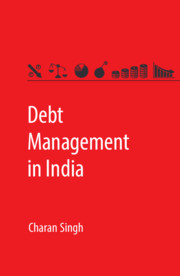Book contents
- Frontmatter
- Contents
- List of Tables and Figures
- Preface
- 1 Introduction
- 2 Public Debt in India
- 3 Ricardian Equivalence: Introduction
- 4 Ricardian Equivalence: Empirical Studies Utilising Consumption Function
- 5 Ricardian Equivalence and Consumption in India
- 6 Monetisation of Debt in India
- 7 Domestic Debt and Economic Growth in India
- 8 Separation of Debt from Monetary Management
- 9 Conclusions and Policy Implications
- Bibliography
- Index
7 - Domestic Debt and Economic Growth in India
Published online by Cambridge University Press: 23 November 2018
- Frontmatter
- Contents
- List of Tables and Figures
- Preface
- 1 Introduction
- 2 Public Debt in India
- 3 Ricardian Equivalence: Introduction
- 4 Ricardian Equivalence: Empirical Studies Utilising Consumption Function
- 5 Ricardian Equivalence and Consumption in India
- 6 Monetisation of Debt in India
- 7 Domestic Debt and Economic Growth in India
- 8 Separation of Debt from Monetary Management
- 9 Conclusions and Policy Implications
- Bibliography
- Index
Summary
In India, domestic debt has been incurred with the main objective of enhancing planned investment for economic development. The rising trend in securing financial resources through public borrowing has specially been steep since the early-80s. In this chapter, the relationship between domestic debt and economic growth in India is explored.
In the literature, there are two views on the relationship between domestic debt and growth which are discussed in Section 7.1. On the basis of the theoretical discussion, a testable hypothesis is also formulated in this section to test the relationship between domestic debt and economic growth. This is followed by a brief review of the empirical literature. In section 7.3, trends in domestic debt and growth, and related issues of tax revenue and government expenditure are discussed. The econometric tests to investigate the relationship between two macro series are briefly mentioned in Section 7.4. The discussion on the data base and the methodological issues pertaining to empirical estimation is presented in Section 7.5. The empirical results are discussed in Sections 7.6 and 7.7. Finally, conclusions are presented.
Theoretical issues on domestic debt and economic growth
In this section, a discussion on the theoretical issues on domestic debt and its relation with economic growth is presented. The two views of domestic debt and growth, prevalent in literature, are discussed followed by a brief discussion on domestic debt and developing economies, with special reference to India. Finally, on the basis of the theoretical discussion, a hypothesis is formulated which is then empirically estimated later in the chapter.
The two views on government debt and economic growth
The impact of domestic debt on economic growth can be analysed in the context of two opposite views – traditional and the Ricardian.
The traditional view
In the traditional view, an increase in government debt, is a burden on the economy. In the short run, in view of the increase in government debt, the consumer would consider himself to be wealthier and therefore would resort to higher spending. The increased demand of goods and services, in view of sticky prices in the short run, will raise output and employment. As the marginal propensity to consume is higher than the marginal propensity to save, the increase in private savings, falls short of the government dis-saving. The real interest rate would rise in the economy encouraging capital inflow from abroad.
- Type
- Chapter
- Information
- Debt Management in India , pp. 184 - 210Publisher: Cambridge University PressPrint publication year: 2018



